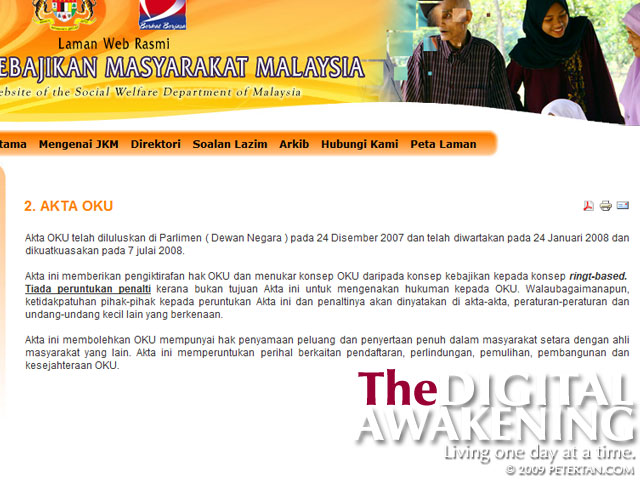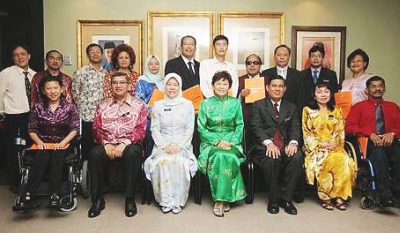Today is the International Day of Persons with Disabilities. I would rather that it be called International Day of Disabled Persons. There is a difference between the two. The former puts the onus of disablement on the person. The person has a disability which is the main cause of the problems that he faces in society. The latter describes the situation of the person who is disabled by attitudinal and physical barriers in society. Read more about what I have written regarding this topic under “Social Model of Disability“.
The theme for this year is “Making the MDGs Inclusive: Empowerment of persons with disabilities and their communities around the worldâ€. MDGs means Millennium Development Goals. The following is a brief on the MDGs with regards to disabled people according to United Nations Enable:
MDGs and persons with disabilities
The United Nations and the global community continue to work for the mainstreaming of persons with disabilities in all aspects of society and development. Although many commitments have been made to include disability and persons with disabilities in development, the gap between policy and practice continues.
Ensuring that persons with disabilities are integrated into all development activities is essential in order to achieve internationally agreed development goals, such as the Millennium Development Goals (MDGs). The MDGs can only be achieved if persons with disabilities and their family members are included. This in turn will ensure that people with disabilities and their family members benefit from international development initiatives. Efforts to achieve the MDGs and implement the Convention are interdependent and mutually reinforcing.
More information on the MDGs and persons with disabilities [http://www.un.org/disabilities/default.asp?id=1470]
So, today is a day dedicated to people like me – people on wheelchairs, people who are blind, people who are deaf and people who are living with other forms of impairment. Thank you so much for remembering us and honouring us and recognising us. All these have no meaning if no affirmative action is taken to reduce the socioeconomic gap between disabled people and non-disabled people.
This can only be achieved by making infrastructure and services accessible to all, first and foremost public transport and the built environment. Without access to these two, there is no way for disabled people to come into mainstream society. The federal government, state governments and local authorities, have the means and resources to do this. Sad to say, most of them do not take the initiative to make the infrastructure inclusive.
The Ministry of Women, Family and Community Development (Kementerian Pembangunan Wanita, Keluarga dan Masyarakat), through the Jabatan Kebajikan Masyarakat Malaysia (Department of Social Welfare Malaysia) is holding a celebration in conjunction with this day on December 5 at Komplex MAB in Brickfields. The Ministry has chosen not to follow the theme promoted by United Nations and instead use “Pendayaupayaan OKU Ke Arah Pembangunan Potensi Diri” (Empowering Disabled People Towards Developing Self Potential).
Talk is cheap. I have heard ministers, wives of ministers and government officials talk about making life easier for disabled people. Many of these “positive announcements” are archived in this blog. As far as I am concerned, nothing has changed. 1Malaysia kah or Rakyat Didahulukan kah, disabled people are still marginalised in every way through ommission, ignorance and discrimination. The people in government should stop talking and start working towards achieving equalisation of opportunities for disabled people. Just resolve our issues. It is as simple as that. We do not need the government spending money celebrating this day but not doing anything afterwards. No thank you!


